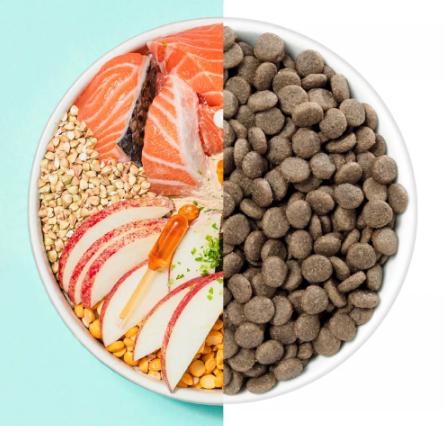When your dog suffers from allergies, selecting the right food becomes a crucial task. Food allergies can cause your dog significant discomfort, leading to symptoms like itching, digestive problems, and even more severe health issues if not addressed promptly. This guide aims to answer the question, “What is the best dog food for dogs with allergies?” by providing a thorough exploration of key factors you should consider. We’ll delve into which ingredients to avoid, how to make informed choices when selecting dog food, and offer you top recommendations that cater specifically to dogs with allergies. By understanding these elements and making thoughtful choices, you can help your dog lead a healthier, happier life, free from the pain and discomfort of food-related allergies.

What Ingredients to Avoid in Dog Food for Allergies?
Common Allergens in Dog Food
Some ingredients in dog food are commonly known to trigger allergic reactions. Ingredients such as beef, dairy, chicken, wheat, and soy are frequent culprits. These allergens can cause a range of symptoms in sensitive dogs, including skin irritations, digestive upset, and chronic ear infections. Identifying these common allergens is essential when choosing food for your allergic dog. Always read the ingredient list on dog food packaging carefully. Avoid products that contain these ingredients, as they are often the cause of your dog’s allergic reactions. Choosing the right food that excludes these allergens can make a significant difference in your dog’s comfort and overall health.
How to Identify Allergenic Ingredients?
Identifying allergenic ingredients in dog food involves observation and a bit of trial and error. Start by closely monitoring your dog for any adverse reactions after eating specific foods. Symptoms might include itching, vomiting, diarrhea, or other signs of discomfort. Elimination diets are a common approach, where you remove suspected allergens from your dog’s diet and gradually reintroduce them to identify the culprits. Additionally, working with your veterinarian to conduct allergy testing can provide more definitive results, helping you to pinpoint the exact ingredients causing the reaction. Once identified, you can select dog foods that are free from these allergens, ensuring your dog’s diet is both safe and nutritious.
Natural Alternatives for Dog Food
For dogs with allergies, natural alternatives to common allergens can provide much-needed relief. Opt for dog foods that include novel proteins like venison, duck, or lamb, which are less likely to trigger allergic reactions compared to more common proteins like chicken or beef. Grain-free options that use sweet potatoes, peas, or quinoa as carbohydrate sources are also beneficial, especially if your dog is allergic to grains like wheat or corn. These natural ingredients not only reduce the risk of allergic reactions but also provide a balanced diet that supports your dog’s overall health. Transitioning to a diet rich in these alternatives can significantly improve your dog’s well-being and reduce the occurrence of allergy-related symptoms.
How to Choose the Best Dog Food for Dogs with Allergies?
Analyzing Nutritional Needs
Understanding and analyzing your dog’s specific nutritional needs is a key step in choosing the best food for allergies. Dogs require a balanced diet that includes proteins, fats, vitamins, and minerals. However, when dealing with allergies, the sources of these nutrients become critically important. Look for dog foods that provide high-quality proteins and healthy fats, but from sources that are less likely to cause allergic reactions. Limited ingredient diets are often recommended, as they reduce the number of potential allergens your dog is exposed to. These diets focus on providing essential nutrients while minimizing the risk of allergic reactions, making them ideal for dogs with sensitivities.
Understanding Labels and Certifications
Navigating dog food labels can be challenging, but it’s an essential skill when your dog has allergies. Pay close attention to the ingredient list, avoiding foods with vague terms like “meat by-products” or “animal fat,” which can include allergenic substances. Instead, look for dog foods that clearly list their protein and carbohydrate sources. Certifications from organizations such as the Association of American Feed Control Officials (AAFCO) can also be a helpful indicator of quality, as these products meet specific nutritional standards. Choosing foods that are specifically labeled as hypoallergenic or designed for sensitive stomachs can further ensure that you’re selecting a product that will minimize your dog’s allergic reactions.
Consulting with a Veterinarian
Consulting with a veterinarian is one of the most important steps in managing your dog’s food allergies. Your vet can help identify the specific allergens affecting your dog through testing and observation. They can also recommend the best dietary options tailored to your dog’s needs, ensuring they receive all necessary nutrients without exposure to harmful allergens. Additionally, regular check-ups with your vet allow for ongoing monitoring of your dog’s health, making it easier to adjust their diet as needed. By working closely with your veterinarian, you can create a customized diet plan that promotes your dog’s health and minimizes allergic reactions, ensuring they live a comfortable, healthy life.

Top Picks: Best Dog Food for Dogs with Allergies
Grain-Free Dog Food Options
Grain-free dog food options are often a go-to choice for dogs with allergies. These foods eliminate common grain-based allergens like wheat, corn, and barley, which can cause digestive issues and skin problems in sensitive dogs. Instead of grains, these foods use alternative carbohydrates such as sweet potatoes, peas, or lentils. Brands like Blue Buffalo, Taste of the Wild, and Wellness offer high-quality grain-free formulas that provide balanced nutrition while minimizing the risk of allergic reactions. Grain-free dog food can be particularly beneficial for dogs that have shown sensitivities to grains, helping to improve their overall health and well-being by reducing inflammation and other allergy-related symptoms.
Limited Ingredient Dog Foods
Limited ingredient dog foods are specifically designed to minimize the risk of allergic reactions by using fewer ingredients. These foods often focus on a single protein source, such as lamb or duck, and a single carbohydrate source, like sweet potatoes or peas. By simplifying the ingredient list, it becomes easier to identify and avoid potential allergens. Brands like Natural Balance, Canidae, and Instinct offer excellent limited ingredient formulas that cater to dogs with food sensitivities. These foods provide all the necessary nutrients without including common allergens, making them an ideal choice for dogs with allergies. Switching to a limited ingredient diet can lead to noticeable improvements in your dog’s health, including fewer allergic reactions and better overall well-being.
Hypoallergenic Dog Food Brands
Hypoallergenic dog foods are formulated with ingredients that are less likely to cause allergic reactions. These foods often use hydrolyzed proteins, which are broken down into smaller molecules that the immune system is less likely to recognize as allergens. Brands like Royal Canin, Hill’s Prescription Diet, and Purina Pro Plan offer hypoallergenic options that are commonly recommended by veterinarians. These foods are designed to meet the nutritional needs of dogs with severe allergies while minimizing the risk of triggering allergic reactions. Hypoallergenic dog foods can be particularly beneficial for dogs with multiple food allergies, providing a safe and balanced diet that supports their health and reduces the discomfort associated with food allergies.
Conclusion
Choosing the best dog food for dogs with allergies is vital for your pet’s health and happiness. By focusing on what ingredients to avoid, understanding how to select the right food, and considering our top recommendations, you can make informed decisions that greatly improve your dog’s quality of life. This guide on what is the best dog food for dogs with allergies has provided you with the tools and knowledge to ensure your dog remains healthy, comfortable, and free from the adverse effects of food-related allergies. Remember, working closely with your veterinarian and carefully selecting the appropriate dog food can prevent allergic reactions and support your dog’s overall well-being, leading to a healthier and happier life.
FAQ:
1. What should I look for in dog food if my dog has allergies?
Look for limited ingredients, novel proteins, and hypoallergenic labels. Avoid common allergens like wheat, soy, and dairy. Consult with your vet for tailored advice.
2. Can grain-free dog food help with allergies?
Yes, grain-free dog food can help by eliminating common allergens like wheat and corn. It uses alternative carbohydrates, reducing the risk of allergic reactions in sensitive dogs.
3. How do I know if my dog’s food is causing allergies?
Monitor your dog for symptoms like itching, digestive issues, and skin rashes. Elimination diets and allergy testing by your vet can identify specific food triggers.
